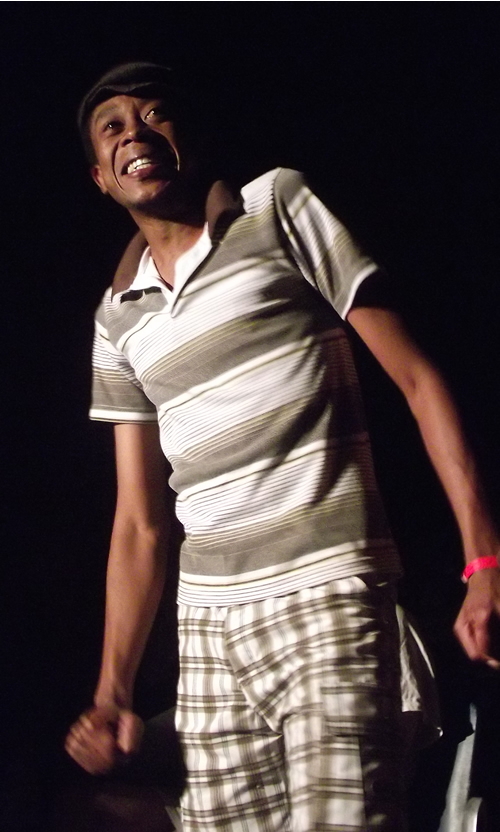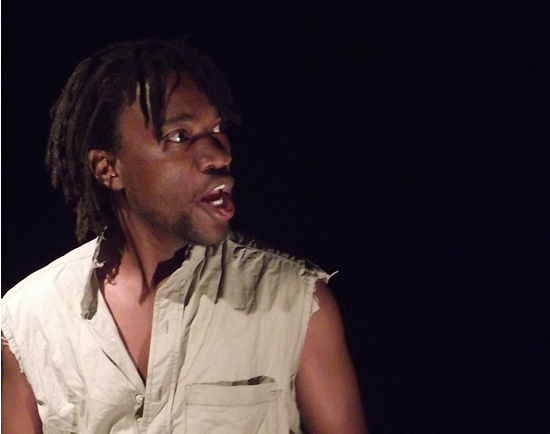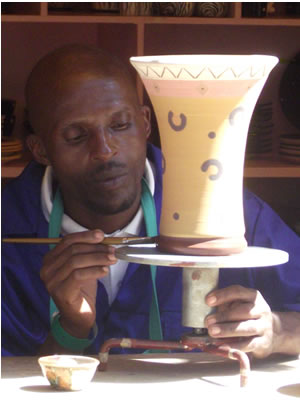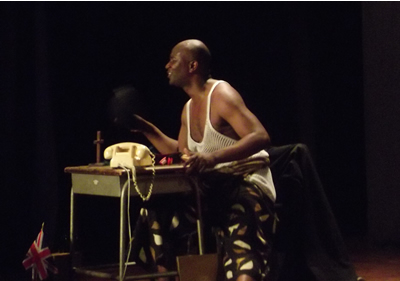Author Archive
HIFA 2011: Burn Mukwerekwere Burn
Friday, April 29th, 2011 by Upenyu Makoni-MuchemwaThe xenophobic violence in South Africa has grabbed headlines in South Africa. Gangs of angry young South Africans frustrated by poverty and unemployment took to the streets of townships like Kayelitsha in Cape Town brutally assaulting and killing hundreds of foreigners.
Burn Mukwerekwere Burn is the story of two Zimbabweans caught in the middle of the maelstrom. The play is at times brutal in its honesty and assessment of the reasons why there are an estimated three million Zimbabweans resident in South Africa. As they attempt to journey to safety, they reflect on the predicament they find themselves in and characters are forced to deal with their own tribal differences. Njabulo is a Shona teacher reduced to carving trinkets for foreigners to buy. Farai, is Ndebele and a trader in South Africa to restock in time for the holidays.
Written by Blessing Hungwe, featuring himself and Michael Kudakwashe, this narrative is the woven perspectives of both protagonists, trying to survive a night of horror in South Africa. Ultimately they come to understand that the things that bind them together, a love of country and life, are greater than the things that keep them apart.
HIFA2011: The Global Quater
Thursday, April 28th, 2011 by Upenyu Makoni-MuchemwaThe Harare International Festival of the Arts opened yesterday with the expected pomp and fanfare. The Festival grounds cover most of Harare gardens and have expanded to include off-site theatre locations like Reps and 7 Arts theatre. I like to shop, and one of my favourite festival locations is the Global Quarter Craft market, located behind the National Gallery. There you find artists and craftsmen who sell items that vary from jewellery and pottery to Zimbabwean stone sculpture.
Some of the craftsmen were working while exhibiting and selling like the potter in the picture above, who was putting the finishing touches on a vase.
And, I didn’t expect to find Carlos Mondlane, who had travelled all the way from the African Arts Centre in Maputo, Mozambique who is exhibiting wooden sculptures at the Festival.
Show me one clean democracy
Thursday, April 28th, 2011 by Upenyu Makoni-MuchemwaIn this moving and thought provoking video clip from The Man Who Committed Thought, the protagonist asks what, really, we mean by justice and democracy, when their foundations are so often rooted in hypocrisy. “I will not be judged by those who refuse to take the speck out of their own eye. They are no fit position to see clearly to take the stone out of mine,” he cautions.
HIFA 2011: The Sonic Slam Chorus
Thursday, April 28th, 2011 by Upenyu Makoni-MuchemwaTheir performance began with a spoken word piece recited by TJ Dema from Botswana, whose first line ‘my dream for Africa’ made me feel that I was going to be impressed. Sonic Slam Chorus is a cross genre collaboration that had been kept alive for several months on the internet before their five days of rehearsal at the Festival. The group members include slam poets TJ Dema and Dickson; Norwegian composer and vocalist Cecilie Giskemo, fellow Norwegian guitar maestro Asbjoern Lerheim, Saxophonist Vee Mukarati, Jazz vocalist Prudence Katomene-Mbofana and drummer Blessing Muparutsa.
The chorus performed five pieces, blending Jazz and spoken word in their performance. They explored diverse themes including Africa’s destiny, the contentious relationship between a father and child, and moving on to describe the ill-fated love a beautiful girl has for a mischievous rebel.
I was impressed, but not by the Chrous as a whole. Sonic Slam Chorus is an obviously well thought out concept. TJ Dema and Dickson are the stars of the performance, their words being well written and therefore powerful and emotive. In particular, TJ uses attention grabbing lyricism, and delicate changes in cadence to deliver the emotion of her words. Unfortunately Prudence does not sing in this act, providing only backing vocals for the performances, which is a pity because she is a force to be reckoned with on the local Jazz scene. Parts vocal portion of the show seemed too lengthy and elaborate, overpowering the subtleties of the spoken word making it inaudible at times.
Watch part of their performance here.
HIFA 2011: The Man who Committed Thought
Thursday, April 28th, 2011 by Upenyu Makoni-MuchemwaA man, educated and African, finds himself in the gallows, charged with crimes against humanity. He is a lawyer, educated in England, with a firm belief in Christian values, and has more than just a passing admiration for the Queen and his adopted country. He is a man who has been alienated from his culture, identity and people. Mamadou, a peasant farmer with a sizeable family but limited means bursts into the lawyer’s life begging him for help, or rather mercy. Mamdou’ s cow has expropriated by the government without compensation and now he wants to sue, to take back the rights that were forcibly taken from him. As the story unfolds the lawyer encounters the corrupt and powerful President Junta, who is shortly unseated in a coup led by ‘Tuff Boy’ a rebel leader. It is only when he witnesses the murder of Mamadou at the hands of the rebels that the lawyer finds his humanity, but in his quest for justice he commits unspeakable crimes, for which he is brought before the court.
The facts of the play may be specific to Sierra Leone, but it is the story of every African country cursed with resources. President Junta may be a dictator, but he is a democratically elected one. He is fat and wealthy off the numerous kick-backs and deals he receives from governments and multinational corporations wishing to do business in his country. Western leaders, donors and corporations treat him like a king, as though the country and its people were his personal property; unchallenged, he behaves accordingly.
‘Tuff Boy’ is a grotesque illustration of a rebel leader, high on cocaine, formerly angry and powerless, until he took up arms and waged war on the government. Tuff boy asserts his power through the gun and innumerable rapes of women who feature in the play as nameless, faceless and voiceless victims.
Colonialism lives on in the lawyer, who condescends towards and patronises Mamadou. Despite his high handed Christianity, the lawyer is torn between his disdain of the ignorant and poor ‘native’, and his baser native instinct which drives him to lust after Mamadou’s daughter.
The man who committed thought is a moving play that is an indictment of the hypocrisy of the human rights agenda, aid, and the nations that give it. It illustrates the conflict between humanitarianism and humanism, and shows that right and wrong are not necessarily black and white, but rather, they are painted in shades of grey.













